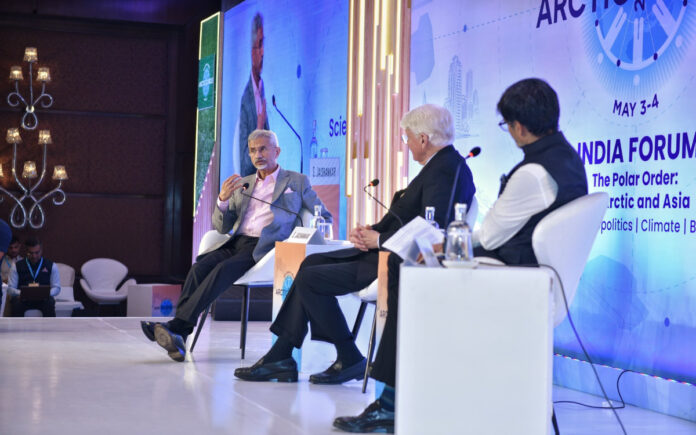New Delhi: External Affairs Minister S. Jaishankar has reaffirmed India’s expanding footprint in the Arctic region, citing the country’s dedicated Arctic policy and strengthened international partnerships as key enablers of this engagement.
Speaking at the Arctic Circle India Forum 2025, Jaishankar underlined India’s long-standing presence in polar research, especially in the Antarctic, and emphasized the country’s increased strategic interest in the Arctic due to global warming, shifting trade routes, and emerging geopolitical concerns.
Pleased to join @ORGrimsson and @samirsaran for a conversation at the #ArcticCircleIndiaForum2025.
— Dr. S. Jaishankar (@DrSJaishankar) May 4, 2025
Spoke about the global consequences of developments in the Arctic. And how the changing world order impacts the region.
Underlined 🇮🇳’s growing responsibilities in the Arctic,… https://t.co/792OAcGcnS pic.twitter.com/F15ao3T9M2
“We have had a growing involvement with the Arctic. We had an even earlier involvement with the Antarctic, which is now more than 40 years. We have come up a few years ago with an Arctic policy. We have agreements with KSAT (Kongsberg Satellite Services) on Svalbard, which is relevant to our space,” Jaishankar said, underscoring India’s scientific and technological cooperation with key Arctic stakeholders.
In conversation with @ORGrimsson and @samirsaran at the #ArcticCircleIndiaForum2025. @orfonline @_Arctic_Circle https://t.co/626uk5lgra
— Dr. S. Jaishankar (@DrSJaishankar) May 4, 2025
The KSAT Svalbard Ground Station (Svalsat), established in 1997 and recognized as the largest polar ground station globally, plays a critical role in satellite data reception for India and other international space missions.
Highlighting the Arctic’s global importance, Jaishankar said: “As the country with the most young people on this planet, what happens in the Arctic is of extreme importance to us… Given the direction in which things are moving, the consequences are going to be felt not just by us but by the entire world.”
Also Read | Baglihar Dam Flow Curtailed as India Turns Up Heat on Pakistan
The Minister also drew attention to how the melting Arctic ice is reshaping the global economic and technological landscape. “Warming is opening new routes, while technological and resource dimensions are set to reshape the global economy. For India, this matters deeply as our economic growth accelerates,” he added.
Jaishankar further pointed out that India’s Arctic engagement is not only driven by environmental concerns but also by the region’s increasing geopolitical weight. “Sharpening geopolitical divides have only heightened the Arctic’s global relevance. The Arctic’s future is inextricably linked to what is happening in the world, including the evolving debates within the US political system,” he said.
Also Read | 96-Hour Ammo Supply Raises Alarms in Pakistan Military Circles
India’s Arctic Policy, released in 2022, outlines a comprehensive framework for cooperation in climate research, connectivity, sustainable development, and international governance of the Arctic. India is also an Observer State in the Arctic Council, which reflects its growing diplomatic and scientific stake in the region.
As climate shifts continue to redraw global priorities, India’s proactive Arctic stance places it firmly among key players influencing the future of one of Earth’s most environmentally sensitive and geopolitically significant frontiers.



